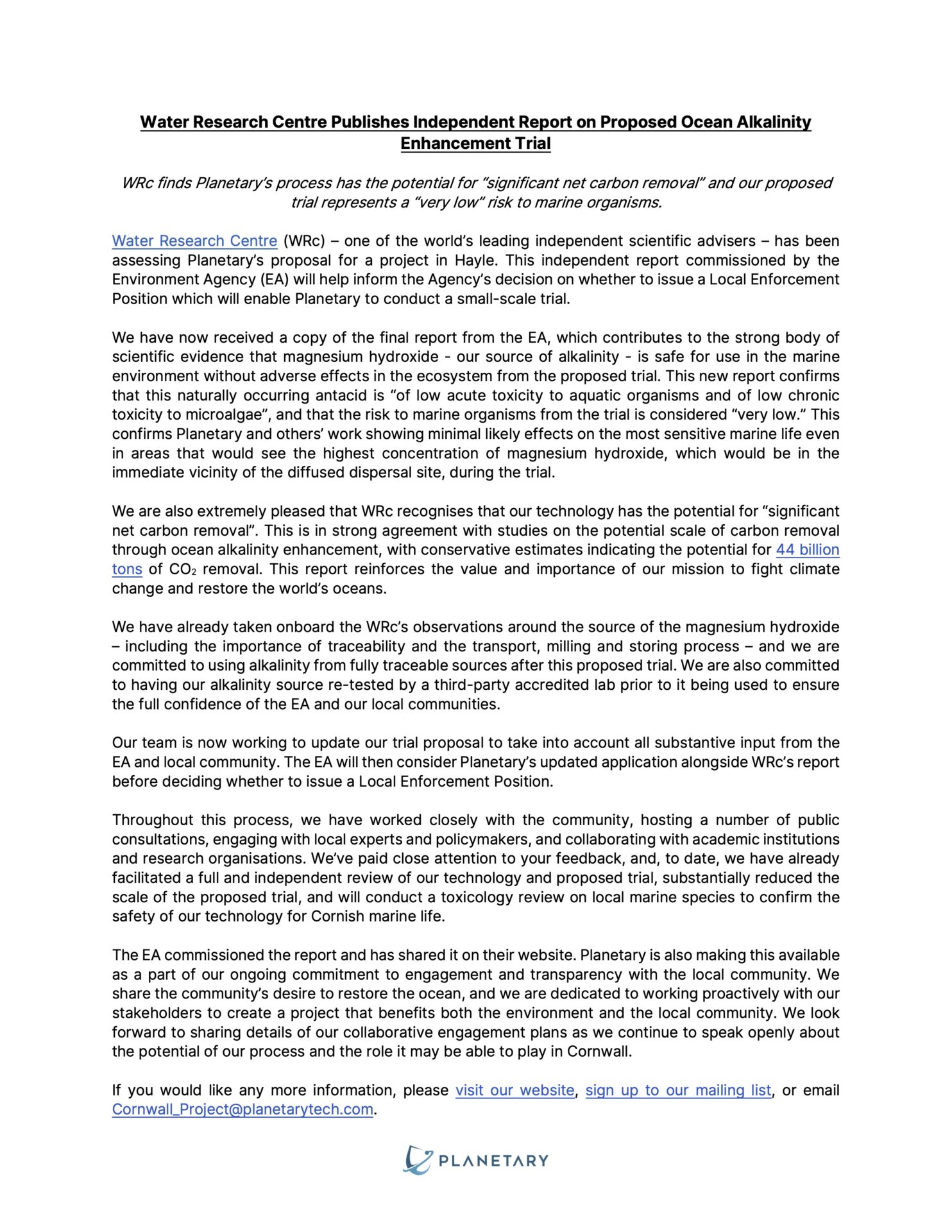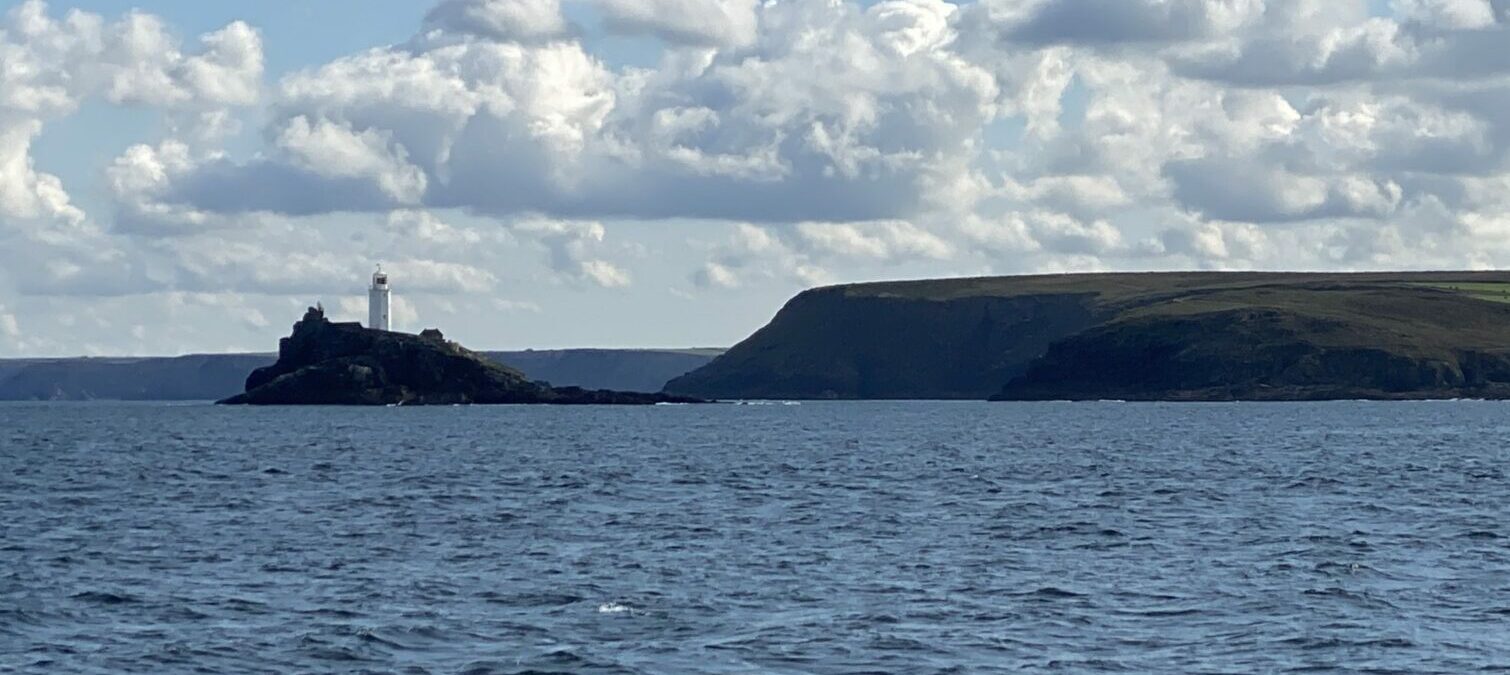
Water Research Centre Independent Report
On Monday, February 12, 2024, the Environment Agency published an independent report produced by Water Research Centre (WRc) regarding Planetary’s proposed ocean alkalinity enhancement trial in Cornwall.
This report finds Planetary’s process has the potential for “significant net carbon removal” and our proposed trial represents a “very low” risk to marine organisms.
The full report, as well as a summary produced by WRc and a list of FAQs produced by Planetary, are available below. Planetary’s statement on the report (shown here) is also available on our blog.
Planetary’s Statement
Access WRc Report
Summary
WRc Report – Summary
Full Report
WRc Full Report
Key Takeaways
The study conducted a comprehensive analysis of Planetary’s alkalinity source, potential impacts on Hayle Wastewater Treatment Works, Planetary’s dispersion modelling, an environmental toxicology assessment, and the carbon sequestration potential of Planetary’s ocean alkalinity enhancement process. Planetary considers the following components of the report particularly noteworthy.
- The report found that magnesium hydroxide, which is the intended alkalinity source, is “of low acute toxicity to aquatic organisms and of low chronic toxicity to microalgae” which means risk to marine organisms during the proposed trial is considered “very low” and that even in the low probability case of any unexpected change, it would be small, localised, and temporary.
Aligned with the report’s recommendations, more extensive laboratory toxicity testing using Planetary’s proposed alkaline products across a range of species native to Cornish waters is underway, and preliminary results will be shared soon. These findings appear to agree with the notion that MH is of very low toxicity to local marine life. - WRc’s report emphasised the importance of monitoring during the trial. Recommendations included assessing impacts to the seabed, monitoring environmental concentrations of magnesium hydroxide, assessing biodiversity of the marine environment, and other aspects. Planetary has committed to a full monitoring program that we believe addresses WRc’s recommendations and will follow the EA’s guidance and requirements to ensure the proposed trial is robustly monitored.
- WRc recognized the potential for “significant net carbon removal,” which is in agreement with many other studies about the potential large positive impact that ocean alkalinity enhancement can provide and shows that there could be significant positive impact from any future deployment of the technology.
- The report also highlights the need for full traceability of any material that could be used in the process. In absence of full visibility, certification and auditing of the vendors along the supply chain, the report recommends testing of the specific material to ensure that it meets EA guidelines. Planetary has committed to conducting this testing.
- The report also highlights the need for validating workers’ conditions at all vendors along the supply chain, especially in the mining sector. Planetary has committed to validating those conditions for future sources of alkalinity.
- Finally, the report found that there likely will be no impact on the operating processes at the wastewater treatment facility.
WRc Report FAQ
Responses to the Report and Going Forward
What has the Environment Agency said in response to the report?
+For information on the Environment Agency’s (EA) response to Water Research Centre’s report, please visit the project’s page on the EA’s Citizen Space.
What does the report mean for Planetary’s trial in Hayle?
+Water Research Centre’s (WRc) report does not represent a decision on Planetary’s proposal for a small-scale trial near St Ives Bay. The report was commissioned by the Environment Agency to help inform its decision on whether to issue a Local Enforcement Position which would enable Planetary to carry out the proposed trial.
Is Planetary conducting trials elsewhere, in addition to the proposed Cornwall trial?
+Yes, we have an active project in Halifax, Canada, a place that many of our team call home. You can read more about our Halifax project on our dedicated page here. We are beginning preparations for trials at other sites as well.
The Halifax trial started in the fall of 2023 and completed in early December, with full awareness and permission of the local regulatory groups. It was done in collaboration with local Dalhousie University. The Dalhousie role is independent of, but coordinated with Planetary’s own research program. Dalhousie’s focus includes testing for any possible ecosystem or organism impacts of the addition.
Although analyses are still ongoing, so far the data suggest that there was no unanticipated change to the ecosystem due to the trial.
Our technology has the potential to restore the ocean – by reducing acidification – and remove carbon dioxide from the atmosphere. Planetary’s vision has always been to conduct small-scale carbon removal at many suitable locations around the world.
To learn more about why the coast near St Ives Bay is perfect for our technology please read our blog post here.
How will Planetary address the recommendations included in the report?
+Planetary is now updating its trial proposal to take into account all substantive input and recommendations from WRc, the Environment Agency (EA) and the local community. The EA will then consider Planetary’s updated application alongside the WRc’s report before deciding whether to issue a Local Enforcement Position.
Will Planetary be selling carbon credits from the proposed trial?
+Planetary has committed not to sell or transfer any carbon removal credits generated during this proposed trial. In the future, it is important that we are able to fund our projects and carbon credit sales are currently the only scalable way to do this. However, Planetary will always respect and fully comply with the decisions of the regulator on this topic.
What does Planetary consider to be the primary messages of the report?
+The study conducted a comprehensive analysis of Planetary’s alkalinity source, potential impacts on Hayle Wastewater Treatment Works, Planetary’s dispersion modelling, an environmental toxicology assessment, and the carbon sequestration potential of Planetary’s ocean alkalinity enhancement process. Noteworthy components of the report included the following.
- Importantly, the report found that magnesium hydroxide, which is the intended alkalinity source, is “of low acute toxicity to aquatic organisms and of low chronic toxicity to microalgae” which means risk to marine organisms during the proposed trial is considered “very low” and that even in the low probability case of any unexpected change, it would be small, localised, and temporary.
Aligned with the report’s recommendations, more extensive laboratory toxicity testing using Planetary’s proposed alkaline products across a range of species native to Cornish waters is underway, and preliminary results will be shared soon. These findings appear to agree with the notion that MH is of very low toxicity to local marine life. - WRc’s report emphasised the importance of monitoring during the trial. Recommendations included assessing impacts to the seabed, monitoring environmental concentrations of magnesium hydroxide, assessing biodiversity of the marine environment, and other aspects. Planetary has committed to a full monitoring program that we believe addresses WRc’s recommendations and will follow the EA’s guidance and requirements to ensure the proposed trial is robustly monitored.
- WRc recognized the potential for “significant net carbon removal,” which is in agreement with many other studies about the potential large positive impact that ocean alkalinity enhancement can provide and shows that there could be significant positive impact from any future deployment of the technology.
- The report also highlights the need for full traceability of any material that could be used in the process. In absence of full visibility, certification and auditing of the vendors along the supply chain, the report recommends testing of the specific material to ensure that it meets EA guidelines. Planetary has committed to conducting this testing.
- The report also highlights the need for validating workers’ conditions at all vendors along the supply chain, especially in the mining sector. Planetary has committed to validating those conditions for future sources of alkalinity.
- Finally, the report found that there likely will be no impact on the operating processes at the wastewater treatment facility.
- Importantly, the report found that magnesium hydroxide, which is the intended alkalinity source, is “of low acute toxicity to aquatic organisms and of low chronic toxicity to microalgae” which means risk to marine organisms during the proposed trial is considered “very low” and that even in the low probability case of any unexpected change, it would be small, localised, and temporary.
Report Background
What is the report and why was it created?
+This report is the culmination of an independent review and appraisal of Planetary’s proposed trial near St Ives Bay by Water Research Centre (WRc). WRc was instructed to carry out this review by the Environment Agency to inform its decision on whether to issue a Local Enforcement Position which would enable Planetary to carry out the proposed small-scale trial.
What does the report cover?
+Water Research Centre’s report is the culmination of an independent review into aspects of Planetary’s proposed trial near St Ives Bay. The report includes an audit of Planetary’s alkalinity source, an audit of the potential impacts on Hayle Wastewater Treatment Works, an audit of Planetary’s dispersion modelling, an environmental toxicology assessment and a review of the carbon sequestration potential of Planetary’s ocean alkalinity enhancement process.
Why is Planetary sharing the report?
+The EA commissioned the report and has shared it on their website (Citizen Space, see below). Planetary is also hosting the report on our website as a part of our ongoing commitment to engagement and transparency with the local community.
What is Planetary proposing?
+For information on Planetary’s proposed trial near St Ives Bay, please visit our Cornwall project page.
What is an LEP?
+South West Water (SWW) can request a Local Enforcement Position (LEP) from the Environment Agency to carry out an activity that is not authorised by SWW’s existing environmental permit. An LEP will reassure SWW that the EA will not normally take enforcement action against them, provided they meet certain conditions.
LEPs are normally only issued when the activity is considered short term and of low risk to the environment. They include several conditions which aim to protect the environment and set out various monitoring and reporting requirements while the activity is carried out.
An LEP can be withdrawn immediately if the EA consider that the activity is causing pollution at any point, or that the requirements aren’t being met.
What is Water Research Centre?
+Water Research Centre (WRc) is a Centre of Excellence of Innovation and Growth based in Swindon, Wiltshire. WRc is considered one of the world’s leading independent scientific and sustainability advisors providing research, consultancy and related services for the water, waste and environment sectors around the globe. For more information, please visit WRc’s website.
How can I access the report?
+Please find links above to download both the summary of the report and the full report.

